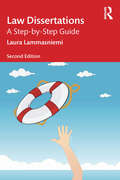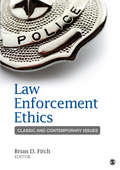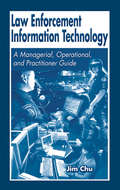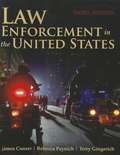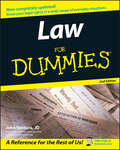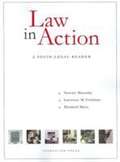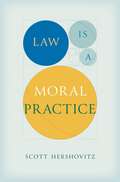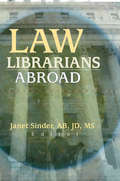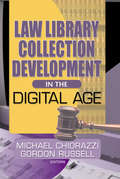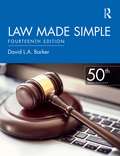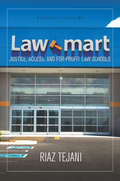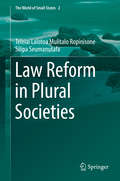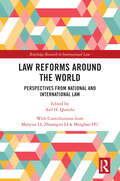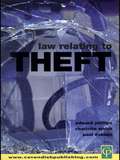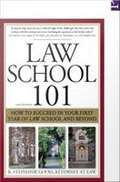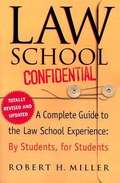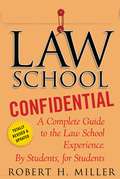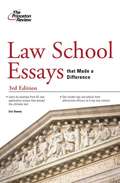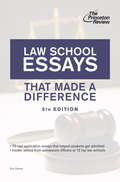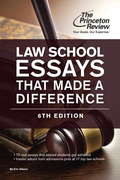- Table View
- List View
Law Dissertations: A Step-by-Step Guide
by Laura LammasniemiLaw Dissertations: A Step-by-Step Guide provides law students with all the guidance and information they need to complete and succeed in their LLB, LLM or law-related dissertation. Written in an accessible, clear format and with plenty of tools to help put the theory into practice, Laura Lammasniemi will show students how to make writing a law dissertation easy, without compromising intellectual rigour. The primary aim of this book is to tackle the issues that cause anxiety to law students undertaking a dissertation so that they can focus on the research that you find exciting. As well as explaining the process of research and outlining the various legal research approaches, the book also provides practical, step-by-step guidance on how to formulate a proposal, research plan, and literature review. The second edition expands guidance to LLM and Masters students, and provides up-to-date guidance on how to complete your project using both online resources and remotely. Unlike other law research skills books, Law Dissertations: A Step-by-Step Guide includes a section on empirical research methodology and ethics for the benefit of students who are studying for a Masters in law. Packed full of exercises, worked examples, and tools for self-evaluation, this book is sure to become an essential guide for law students, supporting them on every step of their dissertation journey.
Law Enforcement Ethics: Classic and Contemporary Issues
by Brian D. FitchThis unique collection of essays covers many of the important facets of law enforcement ethics, including the selection, training, and supervision of officers. Editor Brian D. Fitch brings together the works of a diverse task force with a vested interested in reducing officer misconduct—including law enforcement scholars, educators, and practitioners from a variety of disciplines—to present a comprehensive look at this critical subject that is gaining more attention in agencies and in the media today. The text covers topics on the roles of culture, environment, social learning, policy, and reward systems as they pertain to law enforcement ethics, as well as the ethics of force, interrogations, marginality, and racial profiling. This volume also covers several unique aspects of ethics, such as the role of Post-Traumatic Stress Disorder in misconduct (PTSD), cheating during law enforcement promotional practices, off-duty misconduct, and best practices in developing countries.
Law Enforcement I Student Edition
by Oklahoma Department of Career Technology EducationOur Law Enforcement I curriculum was developed in cooperation with the National Partnership for Careers in Law, Public Safety, Corrections and Security. It provides an estimated 178 hours of instruction for secondary and post-secondary students interested in pursuing a law enforcement career, and is aligned with an end-of-instruction assessment produced by the CareerTech Testing Center.
Law Enforcement Information Technology: A Managerial, Operational, and Practitioner Guide
by James ChuARE YOU PREPARED FOR THE LAW ENFORCEMENT IT REVOLUTION? Law enforcement agencies that are laggards in Information Technology (IT) will soon, if not already, be considered mismanaged. Whether you are in an operational position, or you are a police officer who aspires to a higher rank, you must be aware of how IT can help you perform your job and hel
Law Enforcement and Public Health: Partners for Community Safety and Wellbeing
by Denise Martin Isabelle Bartkowiak-Théron James Clover Richard F. Southby Nick CroftsThe expanding remit of policing as a fundamental part of the public health continuum is increasingly acknowledged on the international scene. Similarly the growing role of health professionals as brokers of public safety means that the need for scholarly resources for developing knowledge and broadening theoretical positioning and questioning is becoming urgent and crucial. The fields of law enforcement and public health are beginning to understand the inextricable links between public safety and public health and the need to shift policies and practices towards more integrated practices. This book comes as a first, an utterly timely scholarly collection that brings together the views of multidisciplinary commentators on a wide range of issues and disciplines within the law enforcement and public health (LEPH) arena. The book addresses the more conceptual aspects of the relationship as well as more applied fields of collaboration, and the authors describe and analyze a range of service delivery examples taken from real-life instances of partnerships in action. Among the topics covered:Defund, Dismantle or Define Law Enforcement, Public Health, and Vulnerability Law Enforcement and Mental Health: The Missing Middle The Challenges of Sustaining Partnerships and the Diversification of Cultures Using Public Health Concepts and Metrics to Guide Policing Strategy and Practice Policing PandemicsLaw Enforcement and Public Health: Partners for Community Safety and Wellbeing is essential reading for a wide array of professions and areas of expertise in the intersectoral field of LEPH. It is an indispensable resource for public health and law enforcement specialists (practitioners, educators, scholars, and researchers) and training programs across the world, as well as individuals interested in developing their knowledge and capacity to respond to complex LEPH issues in the field, including public prosecutors, coroners, and the judiciary. The text also can be used for undergraduate and postgraduate university policing, criminology, sociology, psychology, social work, public health, and medicine programs.
Law Enforcement in the United States
by James A. Conser Rebecca Paynich Terry E. GingerichThis book is an ideal introduction to law enforcement and goes beyond discussions of local policing to examine how forces like technology, privatization, and the threat of terrorism are affecting law enforcement on local, state, and national levels. Readers will learn how these diverse and unpredictable forces are shaping the future of law enforcement in the United States, and will come away with the ability to think critically about law enforcement issues. New Material added to the revised and updated Third Edition:-"Stay Current" boxes throughout the text offer references and key search terms for further internet research-Updated figures, tables, charts and other statistical and descriptive information-A New chapter on socialization, advancement, and professionalism, including ethics and misconduct-A New chapter with emphasis on law enforcement's role in national security, homeland security, and protecting private assets-A separate chapter on "Policing Strategies, Tactics, and Daily Operations"-An expanded and updated chapter on management issues-Updated and expanded appendices
Law For Business And Personal Use
by John Adamson Amanda MorrisonExplore the foundations of business law as well as the application of legal concepts to everyday life. LAW FOR BUSINESS AND PERSONAL USE, 19E, combines strong content and interactive technology with consistent, proven instruction to maintain student interest and support active learning. Coverage includes contracts, criminal law, environmental law, family law, and consumer protection. With more than 1,000 cases, LAW FOR BUSINESS AND PERSONAL USE, 19E, offers plenty of opportunities for case analysis and research.
Law For Dummies, 2nd Edition
by John VenturaGet answers to your legal questions -- in plain English! Find out how to protect your family, your money, your job, and your rights If you're like most people, you probably don't know much about your legal rights and responsibilities -- until you run smack-dab into a messy legal problem. Now revised and updated, this friendly guide helps you get a handle on a wide range of everyday legal issues, decipher legal mumbo-jumbo -- and come out on top. Discover how to: Protect your child support rights Arm yourself against identity theft Clean up your credit and improve your credit score Hire the right attorney for your needs Draw up wills and living wills
Law In Action: A Socio-Legal Reader
by Lawrence M. Friedman Elizabeth Mertz Stewart MacaulayThis text is designed for law students and for courses in legal studies programs. The reader deals in depth with the relationship between the legal system and its surrounding society, including such classic issues as the social sources of law and the impact of legal rules and institutions on society. Other chapters examine the role of judges and lawyers in the system and how culture and historical tradition help mold the legal systems of various societies. The book contains six chapters, each containing classic and contemporary readings on these subjects, with extensive notes and questions to guide the student.
Law Is a Moral Practice
by Scott HershovitzA powerful argument for the essential role of morality in law, getting at the heart of key debates in public life.What is law? And how does it relate to morality? It’s common to think that law and morality are different ways of regulating our lives. But Scott Hershovitz says that this is a mistake: law is a part of our moral lives. It’s a tool we use to adjust our moral relationships. The legal claims we advance in court, Hershovitz argues, are moral claims. And our legal conflicts are moral conflicts.Law Is a Moral Practice supplies fresh answers to fundamental questions about the nature of law and helps us better appreciate why we disagree about law so deeply. Reviving a neglected tradition of legal thought most famously associated with Ronald Dworkin, Hershovitz engages with important legal and political controversies of our time, including recent debates about constitutional interpretation and the obligations of citizens and officials to obey the law.Leavened by entertaining personal stories, guided by curiosity rather than ideology, moving beyond entrenched dichotomies like the opposition between positivism and natural law, Law Is a Moral Practice is a thought-provoking investigation of the philosophical issues behind real-world legal debates.
Law Librarians Abroad
by Janet SinderGain an international perspective on law library practices and precedents!Because law librarianship is an increasingly international field, working and learning abroad can enrich you culturally and professionally. Whether you visit for a few weeks or move halfway across the world for a year or more, Law Librarians Abroad gives you information about exchange programs, tips for adapting to a different culture, and ideas on how to make the most of a life-changing experience. Law Librarians Abroad explains a number of types of work you may find in other countries: US Information Agency or UN library programs informal visits formal exchange programs teaching clients or colleagues to use new technologies temporary library positions combining personal research with library workSome of the contributors to this exciting volume visited completely different cultures. Their new experiences included seeing snow for the first time and scuba diving the Great Barrier Reef. One went home to Korea after 25 years in the United States.Law Librarians Abroad offers practical suggestions as well: pitfalls and pleasures of living in a foreign country how to set up an exchange or plan a visiting librarian program how to build friendships with librarians abroad before you goIn countries from Canada to Zimbabwe, on every continent except Antarctica, the authors of Law Librarians Abroad combined work and travel--and you can too!
Law Library Collection Development in the Digital Age
by Gordon Russell Michael ChiorazziWhile the digital revolution has touched every aspect of law librarianship, perhaps nowhere has the effect been more profound than in the area of collection development. Many of the materials law libraries traditionally collected in print form are now available in electronic format. Digital technology has affected the way we select, order, and process legal materials. The World Wide Web has created an explosion of both commercial and private online publishing. The cost of electronic publishing has caused many traditional law book publishers to sell their companies rather than invest in the needed technologies to compete in the 21st century. Small publishers and book jobbers have been forced to reinvent themselves. The amount of legal information available and its costs continue to soar. Law Library Collection Development in the Digital Age deals with these and other issues related to law library collection development. Chapters range from the theoretical to the practical. Inspired by Penny Hazleton’s seminal paper “How Much of Your Print Collection is Really on Lexis or Westlaw?” the editors and chapter authors of Law Library Collection Development in the Digital Age endeavor to expand on professor Hazleton&’s work, with examinations of: the role of law libraries in strategic planning for distance learning Web mirror sites trust vs. antitrust issues access vs. ownership issues how law libraries deal with electronic court records, dockets, and filings the growth of e-journals as they relate to legal publishing how the Hein Greenslips and Blackwell North America’s Bookservice cover legal materials past, present, and future roles of specialized book jobbers and more! Anyone interested in law librarianship or the information industry will find this book informative and useful. Make it a part of your professional collection today.
Law Made Simple
by David L.A. BarkerThis fourteenth edition of Law Made Simple marks the fiftieth year of the publication for one of the best-selling UK Law books. It is the perfect introduction to the English Legal System, and combines an overview of both the legislation and case law relating to all the foundation subjects, including Contract, Torts, Land, Trusts, Criminal, Public and EU. Fully updated, this book acts as a clear and concise guide for students studying law at any level, and takes into account developments across the curriculum. It is suitable for students studying law at A-Level, or as an excellent background for students thinking of embarking on the study of law or related course at degree level.
Law Mart: Justice, Access, and For-Profit Law Schools
by Riaz TejaniAmerican law schools are in deep crisis. Enrollment is down, student loan debt is up, and the profession's supply of high-paying jobs is shrinking. Meanwhile, thousands of graduates remain underemployed while the legal needs of low-income communities go substantially unmet. Many blame overregulation and seek a "free" market to solve the problem, but this has already been tested. Seizing on a deregulatory policy shift at the American Bar Association, private equity financiers established the first for-profit law schools in the early 2000s with the stated mission to increase access to justice by "serving the underserved". Pursuing this mission at a feverish rate of growth, they offered the promise of professional upward mobility through high-tech, simplified teaching and learning. In Law Mart, a vivid ethnography of one such environment, Riaz Tejani argues that the rise of for-profit law schools shows the limits of a market-based solution to American access to justice. Building on theories in law, political economy, and moral anthropology, Tejani reveals how for-profit law schools marketed themselves directly to ethnoracial and socioeconomic "minority" communities, relaxed admission standards, increased diversity, shook up established curricula, and saw student success rates plummet. They contributed to a dramatic rise in U.S. law student debt burdens while charging premium tuition financed up-front through federal loans over time. If economic theories have so influenced legal scholarship, what happens when they come to shape law school transactions, governance, and oversight? For students promised professional citizenship by these institutions, is there a need for protections that better uphold institutional quality and sustainability? Offering an unprecedented glimpse of this landscape, Law Mart is a colorful foray into these essential questions.
Law Office Management For Paralegals (Aspen Paralegal)
by Laurel A. VietzenLaw Office Management for Paralegals, Fourth Edition is a comprehensive introduction to law office management, emphasizing ethics, law office culture, law office systems, and “soft skills,” such as communications and critical thinking. Assignments are drawn from real-world law office management situations and supported by innovative visual aids and learning tools. Students get hands-on practice with timekeeping, conflicts-checking, file management, trust accounting, business planning, correspondence, and much more. They are exposed to law office software, such as Clio, and learn to perform vital functions using other software and even freeware. Career profiles emphasize the importance of involvement in professional organizations, advancement in the legal field without obtaining a law degree, and that the legal profession is populated by men and women of all ages and backgrounds. New to the Fourth Edition: New ethical discussions: the obligation to keep up with current technology, disaster planning, and dealing with clients using crowdfunding. New technology discussions: artificial intelligence in legal practice, online notarization, client portals, and apps to make the practice of law more efficient and mobile. New discussions of law as a business: features of property insurance, malpractice insurance, insurance for and on employees; trends in office space. New soft skills discussions: dealing with incivility in the legal profession, managing staff through technology changes. Professors and students will benefit from: Author Laurel A. Vietzen’s outstanding reputation in the paralegal market. Drawing on her extensive background as a professor and practitioner, she clearly presents basic law office management and organization. Well-crafted assignments throughout the text help students hone practical skills such as critical thinking, organization, general communication, and computer proficiency. The text is particularly adaptable for an online or hybrid class.
Law Reform in Plural Societies
by Teleiai Lalotoa Mulitalo Ropinisone Silipa SeumanutafaThis book asserts that the Pacific Islands continue to struggle with the colonial legacy of plural legal systems, comprising laws and legal institutions from both the common law and the customary legal system. It also investigates the extent to which customary principles and values are accommodated in legislation. Focusing on Samoa, the author argues that South Pacific countries continue to adopt a Western approach to law reform without considering legal pluralism, which often results in laws which are unsuitable and irrelevant to Samoa. In the context of this system of law making, effective law reform in Samoa can only be achieved where the law reform process recognises the legitimacy of the two primary legal systems. The book goes on to present a law reform process that is more relevant and suitable for law making in the Pacific Islands or any post-colonial societies.
Law Reforms around the World: Perspectives from National and International Law (Routledge Research in International Law)
by Asif H. QureshiEncapsulating Law Reform requires the creation of a discreet space occupied with normative self-generation, self-correction, and self-adaptation in the very anatomy of law and the architecture of legal systems. This ‘living dynamic trait’ should be a hallmark of the genetic material in the modern-day institution of law. This edited volume sheds light on Law Reform in its domestic, comparative, regional, and international settings. It examines the process of Law Reform and explains the need for a constant appraisal to keep its wheels optimally operational. The book takes a holistic approach to understanding Law Reform and calls for such an approach in the very process of Law Reform. It begins by looking at Law Reform processes from a theoretical perspective. Thereafter, it sheds light on domestic Law Reform processes in civil and common law legal systems. This is followed by a focus on Law Reform at the international level with a critical appraisal of the International Law Commission (ILC), drawing on its performance in international economic and environmental law. Included in this consideration is also the role played in Law Reform by the IMF, World Trade Organization/World Intellectual Property Organization, Multilateral Development Banks, and the African Union Commission on International Law. This volume should appeal to students, serious scholars, policy makers, judges, and the community of national and international lawyers interested in bringing effective reform in the national and international arenas.
Law Relating To Theft
by C. WalshThis series of papers was presented at a conference held in 1992 to mark the twenty-fifth anniversary of the creation of a first national Ombudsman under the Parliamentary Commissioner Act 1967. The distinguished contributors present an intriguing picture of the Ombudsman in a number of contexts. Accessibility to the Parliamentary Commissioner is considered and there is an analysis of the arguments surrounding recent proposals for a so called Prison Ombudsman. A comparative dimension is introduced with an examination of the Polish Commissioner for Civil Rights Protection. A significant element of the paper on the issue of competence to deal with the legality of administrative action. There is also an examination of the dynamics that continue to shape the Local Government Ombudsman remedy.
Law Relating to Computers Internet and E-Commerce
by Nandan KamathLaw Relating to Computers, Internet + E-Commerce by Nandan Kamath is a comprehensive legal treatise that addresses the challenges and complexities posed by the digital revolution. It serves as an essential guide to understanding India’s cyber laws, particularly the Information Technology Act, 2000, along with its associated rules, regulations, and amendments. The book explores key legal concerns in cyberspace including electronic contracts, digital signatures, data privacy, cybercrimes, domain name disputes, and intellectual property rights. It provides insights into emerging issues like cyberstalking, cyberporn, and the taxation of e-commerce, supported by detailed case law and international perspectives. With contributions from legal scholars and students, and a foreword by Prof. N.R. Madhava Menon, this updated fifth edition remains an authoritative resource for lawyers, IT professionals, policymakers, and students navigating the intersection of law and technology in the digital age.
Law School 101
by R. Stephanie GoodEverything you need to know to excel in your first year of law school and beyond. Whether you are thinking about law school, have already applied and been accepted, or started your first year, you need to know what to expect in law school and how to succeed. Law School 101 gives an honest look at the law school experience from someone who has been there, and tells students what they should really expect. It also helps students develop the skills necessary to survive the challenges and excel in their program. It includes the survival skills you need in key areas, including: Handling the pressure of law school What to expect from your classes and professors How to study for and pass your law school exams Job information for first and second year students Avoid common pitfalls, decode law school myths, and achieve your dream.
Law School Confidential
by Robert M. MillerIt provides a comprehensive, chronological account of what to expect at every stage of law school experience. This new, completely revised and updated edition contains the very latest information and strategies for thriving in law school.
Law School Confidential: A Complete Guide to the Law School Experience: By Students, for Students
by Robert H. MillerI WISH I KNEW THEN WHAT I KNOW NOW!Don't get to the end of your law school career muttering these words to yourself! Take the first step toward building a productive, successful, and perhaps even pleasant law school experience--read this book!Written by students, for students, Law School Confidential has been the "must-have" guide for anyone thinking about, applying to, or attending law school for more than a decade. And now, in this newly revised third edition, it's more valuable than ever. This isn't the advice of graying professors or battle-scarred practitioners long removed from law school. Robert H. Miller has assembled a blue-ribbon panel of recent graduates from across the country to offer realistic and informative firsthand advice about what law school is really like.This updated edition contains the very latest information and strategies for thriving and surviving in law school--from navigating the admissions process and securing financial aid, choosing classes, studying and exam strategies, and securing a seat on the law review to getting a judicial clerkship and a job, passing the bar exam, and much, much more. Newly added material also reveals a sea change that is just starting to occur in legal education, turning it away from the theory-based platform of the previous several decades to a pragmatic platform being demanded by the rigors of today's practices.Law School Confidential is a complete guide to the law school experience that no prospective or current law student can afford to be without.
Law School Essays That Made a Difference
by Eric OwensOne of the best ways to stand out in a crowd of applicants to law school is to write an exceptional personal statement. Law School Essays That Made a Difference, 3rd Edition, contains 70 real application essays as well as interviews with admissions pros and with students who've been through the process and made it to law school.
Law School Essays That Made a Difference, 5th Edition
by Princeton ReviewStand out in a crowd of law school applicants with an outstanding personal statement. Law schools are receiving more applications than ever with high LSAT scores and excellent grades. To get in, you also need a personal statement that shines. The fifth edition of Law School Essays That Made a Difference gives you the tools to do just that. It includes: * 70 real essays written by 62 unique future lawyers attending Columbia, Cornell, Duke, Georgetown, Harvard, Northwestern, Vanderbilt, Yale, and other top law schools--along with each applicant's test scores, GPA, and admissions profile * An overview of law school admissions and a "crash course" in prepping your application * Insider advice: Interviews with admissions pros at Berkeley, Cornell, Duke, Georgetown, Northwestern, Texas Tech, UCLA, University of Kansas, University of Michigan, UPenn, University of Richmond, and William & Mary Law School Essays That Made a Difference, 5th Edition includes essays written by students who enrolled at the following schools:Amherst CollegeBard CollegeBarnard CollegeBoston CollegeBrown UniversityBryn Mawr CollegeCalifornia Institute of TechnologyClaremont McKenna CollegeCornell UniversityDartmouth CollegeDuke UniversityEmerson CollegeFranklin W. Olin College ofEngineeringGeorgetown UniversityHarvard CollegeMassachusetts Institute ofTechnologyMiddlebury CollegeNew College of FloridaNew York UniversityNorthwestern UniversityPomona CollegePrinceton UniversityRice UniversitySmith CollegeStanford UniversitySwarthmore CollegeUniversity of California--San DiegoUniversity of Notre DameUniversity of PennsylvaniaWashington and Lee UniversityWellesley CollegeWesleyan UniversityYale University
Law School Essays That Made a Difference, 6th Edition
by Princeton ReviewThe inside word on law school admissions.To get into a top law school, you need more than high LSAT scores and excellent grades--you also need a personal statement that shines. Law School Essays That Made a Difference, 6th Edition, gives you the tools to craft just that. This book includes:* 70 real essays written by 63 unique law students attending Columbia, Harvard, Northwestern, Vanderbilt, and other top law schools--along with each applicant's test scores, GPA, and admissions profile * An overview of law school admissions and tips for prepping your applications* Insider advice: Interviews with admissions pros at 17 top law schools, including Berkeley, Northwestern, UCLA, and many moreLaw School Essays That Made a Difference, 6th Edition, includes essays written by students who enrolled at the following law schools:American University Washington College of LawBoston College Law SchoolBoston University School of LawColumbia University School of LawCornell University School of LawDuke University School of LawEmory University School of LawGeorgetown University Law CenterHarvard University Law SchoolNew York University School of LawNorthwestern University School of LawThe University of Chicago Law SchoolUniversity of Michigan Law SchoolUniversity of Pennsylvania Law SchoolUniversity of Virginia Law SchoolYale University Law SchoolFrom the Trade Paperback edition.
